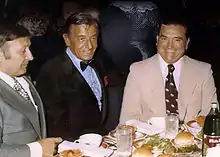Charles W. Sandman Jr.
Charles William Sandman Jr. (October 23, 1921 – August 26, 1985) was an American Republican Party politician who represented New Jersey's 2nd congressional district in the United States House of Representatives and was the party's candidate for Governor of New Jersey in 1973.
Charles W. Sandman Jr. | |
|---|---|
 | |
| Member of the U.S. House of Representatives from New Jersey's 2nd district | |
| In office January 3, 1967 – January 3, 1975 | |
| Preceded by | Thomas C. McGrath Jr. |
| Succeeded by | William J. Hughes |
| Member of the New Jersey Senate | |
| In office 1955-1967 | |
| Personal details | |
| Born | Charles William Sandman Jr. October 23, 1921 Philadelphia, Pennsylvania, U.S. |
| Died | August 26, 1985 (aged 63) Middle Township, New Jersey, U.S. |
| Political party | Republican |
| Profession | Politician |
Biography
Personal
Sandman was born in Philadelphia, Pennsylvania. He graduated from Cape May High School, attained a bachelor's degree from Temple University in Philadelphia, and a law degree from Rutgers School of Law–Newark.[1]
Sandman married Marion L. Cooney of Philadelphia and produced six children; Carol, William, Marion, Robert, Charles and Richard.
Sandman's sons, Robert S. Sandman, Charles W. Sandman III and Richard E. Sandman followed their father's legal footsteps, having a law practice in Cape May Court House, New Jersey.
Sandman died on August 26, 1985, in Cape May Court House, New Jersey. At the time of his death, he was a resident of the Erma section of Lower Township, New Jersey,[2] and was interred in Cold Spring Presbyterian Cemetery in Cold Spring, New Jersey.

Career
Sandman served in the United States Army Air Corps as a navigator during World War II, and spent seven months as a prisoner of war in Germany after being shot down.[2]
Before serving in Congress, Sandman was elected to three 4-year terms in the New Jersey Senate, in 1955, 1959, and 1963. He held the post of Majority Leader of that body in 1964 and 1965. In 1966, he ran for Congress while still holding his State Senate seat, which he resigned upon winning the federal office. He was a delegate to the Republican National Conventions in 1956, 1960, 1964 and 1968.
In 1973, Sandman ran for governor as a conservative, defeating moderate incumbent Republican William T. Cahill in the Republican primary election in a victory that "shocked party leaders", according to The New York Times.[3] In the general election, Sandman lost to Democrat Brendan Byrne in a landslide, following the pattern where New Jersey would often elect moderate Republicans to statewide office but consistently reject more conservative Republicans.

Sandman was on the House Judiciary Committee when it considered articles of impeachment against President Richard Nixon. He was the most vitriolic defender of Nixon in the hearings.[4]
In the 1974 Congressional elections, Republicans suffered generally because of the Watergate scandal that had by the time of the election forced Nixon to resign. Although Sandman announced that he would vote for impeachment on the House floor after the release of the "smoking gun" transcript (as did all of the Republicans who had voted against the articles in committee), his reputation was severely tarnished by his performance in the televised hearings. He was soundly defeated by Democrat William J. Hughes, his opponent in 1974, in an election that Sandman described as "not a Republican year"[5] Following his defeat in his reelection bid for Congress, Sandman was approached by Vice President Nelson Rockefeller to join the Ford administration in various capacities including an ambassadorship of his choosing, Sandman declined and instead opted to accept Governor Thomas Kean's invitation to be appointed to the bench of the Superior Court of New Jersey.
References
- "Sandman, Charles William, Jr., (1921 - 1985)", Biographical Directory of the United States Congress. Accessed September 22, 2019. "Sandman, Charles William, Jr., a Representative from New Jersey; born in Philadelphia, Pa., October 23, 1921; graduated from Cape May High School, Temple University, Philadelphia, Pa., and Rutgers University Law School, Newark, N.J."
- Kerr, Peter. "Ex-rep. Charles Sandman. Nixon Supporter, Dies", The New York Times, August 27, 1985. Accessed September 22, 2019. "He was 64 and lived in Erma Park, N.J.... Along the way, Mr. Sandman became a Golden Gloves boxer and served as an Army Air Corps navigator during World War II. Mr. Sandman's plane was shot down on his 23d birthday and he spent seven months as a prisoner of war in Germany."
- Sullivan, Ronald. "Sandman Defeats Cahill In New Jersey's Primary; Democrats Select Byrne", The New York Times, June 6, 1973. Accessed September 22, 2019. "While the Byrne victory in the Democratic primary was anticipated, Mr. Sandman's surprisingly strong run in the Republican election shocked party leaders throughout the state."
- Barone, Michael; Ujifusa, Grant (1987). The Almanac of American Politics 1988. National Journal. p. 740.
- Narvaez, Alfonso A. "'Not a Republican Year,' Sandman Says", The New York Times, November 7, 1974. Accessed September 22, 2019. "'This was just not a Republican year,' Mr. Sandman said. 'They [the voters] held the incumbent Republicans responsible for the economic situation.'"
External links
- United States Congress. "Charles W. Sandman Jr. (id: S000045)". Biographical Directory of the United States Congress.
- Charles William Sandman Jr. at The Political Graveyard
- Charles Sandman at Find a Grave
| U.S. House of Representatives | ||
|---|---|---|
| Preceded by Thomas C. McGrath Jr. |
Member of the U.S. House of Representatives from New Jersey's 2nd congressional district January 3, 1967 – January 3, 1975 |
Succeeded by William J. Hughes |
| Political offices | ||
| Preceded by William E. Ozzard |
President of the New Jersey Senate 1964-1965 |
Succeeded by John A. Lynch Sr. |
| Party political offices | ||
| Preceded by William T. Cahill |
Republican Nominee for Governor of New Jersey 1973 |
Succeeded by Raymond Bateman |